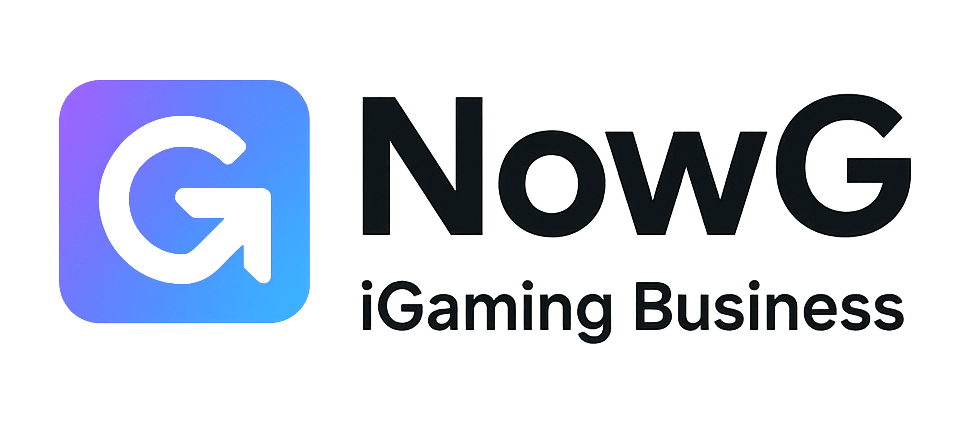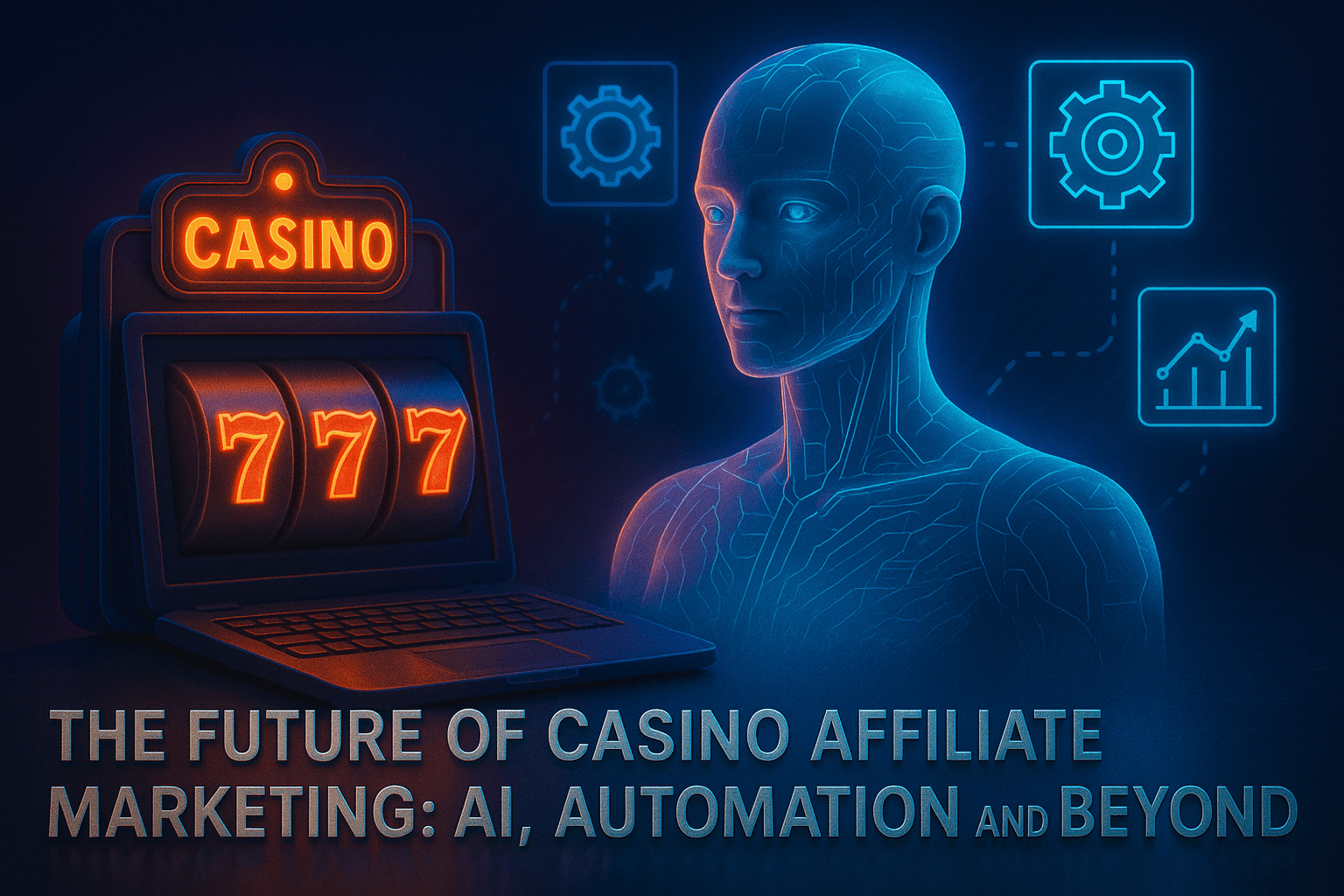Last Updated on September 2, 2025 by Caesar Fikson
The conversation about casino affiliate marketing trends used to orbit around tighter regulation, tougher compliance audits, and, of course, cookie-less tracking in affiliate marketing. Then artificial intelligence slipped from sci-fi panel discussions into daily ops.
Today, every serious program is field-testing AI-driven affiliate tools that draft copy, price media, flag fraud, and even negotiate RevShare tiers on the fly.
The scale is dizzying: platforms report 50-plus data points per click, and machine learning for casino affiliates crunches them in milliseconds to decide which player deserves the next €500 VIP bonus.
Why does that matter?
Because automation in affiliate marketing doesn’t merely shave payroll; it rewrites strategy cadence.

When predictive analytics for affiliate marketing hand you a confidence score on LTV before a player finishes registration, suddenly creative testing, affiliate payout curves, and responsible-gaming interventions can all trigger in the same heartbeat. And if your stack can’t keep up, high-value traffic will quietly reroute to a competitor’s smarter funnel.
From Gut Instinct to Predictive Certainty
Remember the pre-AI era when “data-driven” meant exporting yesterday’s clicks into Excel and eyeballing pivot tables? I do—and I don’t miss it. Today, gradient-boosting models absorb historical CRM records, live bet velocity, and even seasonality quirks to forecast lifetime value within ±12 percent after the first deposit.(imd.org) That single leap turns acquisition from a budget gamble into something close to actuarial science.
It’s exciting, but also unsettling.
Campaigns that once looked healthy now get culled because AI spots attrition risk three steps earlier. It’s a brutally honest mirror; managers who ignore the alerts watch ROI erode in real time. Have you considered how that recalibration reshapes affiliate conversations around minimum deposits, negative carryovers, or hybrid deals?
Automation That Actually Automates
Let’s face it—half the “automation tools for iGaming marketing” pitched at conferences amount to glorified email triggers. The real game-changers live deeper:
- Real-time tracking for casino affiliates. Server-side beacons capture events long after the pixel horizon, letting AI re-score value every time a player bets, withdraws, or hits a self-exclusion flag.(Scaleo)
- Adaptive commission engines. NLP in affiliate marketing strategies parses partner-chat transcripts, detects churn anxiety, and floats retention incentives before anyone escalates.
- Creative permutation. Generative-ad models test hundreds of headline–image matchups per hour, then auto-route spend to the top decile. Costly? Yes. But one iGaming group told us their CAC fell 14 percent within eight weeks of flipping the switch.
It’s frustrating when legacy dashboards lag by a full business day while AI demands feedback loops in seconds. The takeaway: either integrate the event bus end-to-end, or accept that your RevShare model in casino affiliates will always be reactive, never proactive.
Before vs After AI — A Quick Reality Check
(Benchmarks aggregated from five mid-tier EU programs, Q1 2020 vs Q1 2025.)
| Aspect | Pre-AI (2015-2020 averages) | AI-Driven (2025 benchmarks) |
|---|---|---|
| Lead-scoring accuracy | 55 % probability of high-LTV identification | 83 % probability (ML predictive models) |
| Attribution lag | 12–24 h batch reconciliation | < 5 min streaming updates |
| Fraud-detection false positives | 7 % of paid FTDs later clawed back | 1.5 % (AI-powered fraud detection in iGaming) |
| Personalization depth | Country-level | Single-user graph (device + behavior) |
| Campaign optimization cycle | Weekly manual bids | Continuous AI algorithms for affiliate optimization |
| Analyst hours / 1 000 FTDs | 26 h | 9 h |
| Avg. CAC on RevShare | €130 | €104 |
| Revenue uplift vs 2020 baseline | — | +18 % YoY |
See the pattern?
AI doesn’t just cut costs; it compresses time. The dangerous side-effect is strategic whiplash for teams still staffed like it’s 2018.
Technique Cheat Sheet: Where Each AI Flavor Fits
| Domain | AI Technique | Practical Use in smart casino affiliate software | KPI Lift (Observed) | Adoption Stage (2025) |
|---|---|---|---|---|
| Predictive LTV | Gradient boosting / time-series | Auto-tier RevShare before first withdrawal | +12 % profit margin | Mainstream |
| Real-time bidding | Reinforcement learning | Adjust CPC on meta-search in < 60 s | –9 % media waste | Early majority |
| Content generation | Large language models & NLP | Localize bonus pages at scale | 4× output speed | Early majority |
| Fraud detection | Ensemble anomaly scoring | Block botnets within three events | –78 % fraudulent commissions | Mature |
| Player sentiment | Transformer-based topic models | Trigger retention emails on negative chat | +7 pt VIP retention | Emerging |
| Creative testing | Multi-armed bandit | Swap hero images dynamically | +11 % CTR | Emerging |
Data sources: platform whitepapers, public case studies, and internal NowG sandbox testing as of April 2025.
Fraud Becomes a Speed Game
Bots evolve faster than policy docs, which is why AI-powered fraud detection in iGaming shifted from rule-based alerting to unsupervised clustering. Tools ingest keyboard cadence, deposit variance, and IP entropy, then quarantine dubious sessions before the affiliate ledger tallies commissions. SEON’s 2025 fraud outlook claims operators using real-time AI slash chargebacks by 60 percent year-one.
It’s game-changing, but it raises a thorny question: how quickly do you feed that intel back to partners without nuking morale? Top programs now share a risk-adjusted earnings metric—half transparency, half gentle nudge.
Personalization: From Demographic Buckets to One-Player Graphs
Cookie-less targeting felt like a death sentence until AI stitched devices, hashed emails, and behavioral cohorts into resilient identity graphs. The result? Personalized affiliate marketing with AI that greets a returning blackjack fan on mobile with precisely the table limit she flirted with on desktop.
Players convert 22 percent faster, according to data-analytics studies focused on AI trends in casino advertising.
The emotional win: affiliates finally show creatives that feel bespoke rather than spray-and-pray. The operational pain: sudden increases in CRM-API calls and GDPR audit trails. Compliance never sleeps, and automation must come with automated logging—or enjoy the regulatory hangover.
Revenue Models Re-Engineered by Algorithms
AI doesn’t care if you love CPA, RevShare, or a cocktail of both; it hunts for margin. Programs layering predictive churn scores on top of RevShare scaling tiers quietly optimize partner portfolios: traffic delivering under-forecast LTV slides toward flat CPA, volatile influencers shift to hybrid, and whale farms keep high-throttle revenue share. One UK operator saw 5 percent incremental EBITDA simply by letting AI re-map commission curves monthly.
Is it fair?
Depends on which side of the spreadsheet you sit. But ignoring AI-enriched commission logic invites adverse selection—the sharpest affiliates cluster where algorithms pay fairly for risk, and everyone else becomes your accidental overhead.
What No One Tells You About AI Debt
Honestly, there’s a dark underbelly. Every new model creates monitoring debt: bias drift, data skew, explainability. Teams euphoric about AI in casino affiliate marketing often forget versioning or even basic rollback plans. A mis-trained model once downgraded a VIP segment at NowG for twelve hours; the revenue dip was noticeable, the Slack thread was not printable. Guardrails—unit tests for algorithms, blue-green deployments—are the boring heroics that keep AI from torching goodwill.
Automation’s Cultural Shock
Seasoned marketers grew up trusting instinct; automation tools for iGaming marketing replace “I think” with “the model scores…” That cultural shift triggers silent pushback—veterans cherry-pick data to defend gut calls, juniors anchor blindly to dashboards.
The cure?
Transparent KPI diffs.
Show the delta between AI and human calls, celebrate whichever wins, iterate. Ego must yield to empirical lift.
Beyond 2025—Quantum Curves and Zero-Knowledge Promos
Looking down the line, secure multi-party computation hints at letting partners query LTV models without exposing raw PII, easing privacy concerns. Zero-knowledge proof loyalty badges could let affiliates verify VIP status with no data leak whatsoever. And quantum machine learning prototypes promise to crunch full clickstreams in real time, but also threaten to bust today’s encryption—raising fresh compliance nightmares.
Truth be told, we’re only halfway through the playbook. Adaptable operators treat AI as the perpetual beta version of their enterprise, not a one-off plugin.
The question you should probably wake up with tomorrow: if AI flipped your campaign logic in the next five minutes, would you notice—and would you let it?




